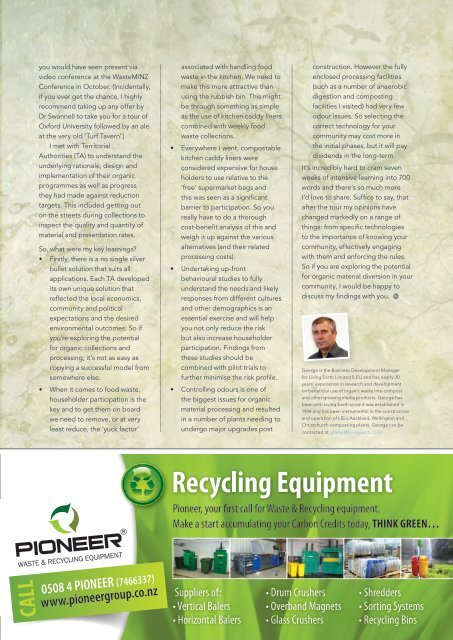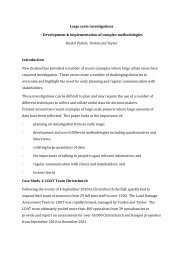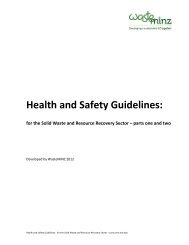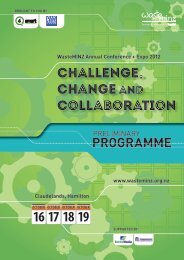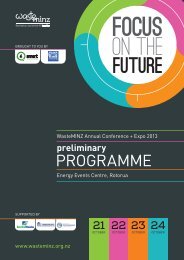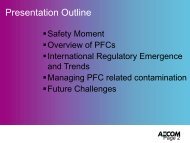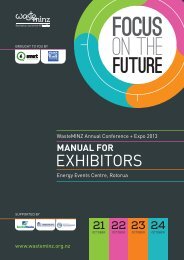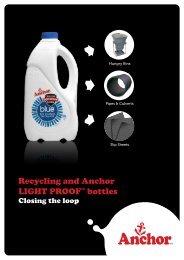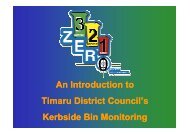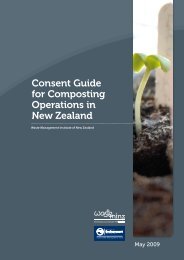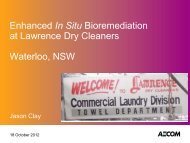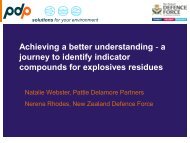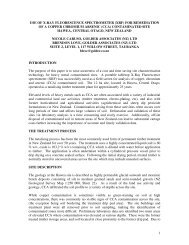Kaibosh
e-WasteAwareness March 2013 - WasteMINZ
e-WasteAwareness March 2013 - WasteMINZ
- No tags were found...
Create successful ePaper yourself
Turn your PDF publications into a flip-book with our unique Google optimized e-Paper software.
you would have seen present via<br />
video conference at the WasteMINZ<br />
Conference in October. (Incidentally,<br />
if you ever get the chance, I highly<br />
recommend taking up any offer by<br />
Dr Swannell to take you for a tour of<br />
Oxford University followed by an ale<br />
at the very old ‘Turf Tavern’.)<br />
I met with Territorial<br />
Authorities (TA) to understand the<br />
underlying rationale, design and<br />
implementation of their organic<br />
programmes as well as progress<br />
they had made against reduction<br />
targets. This included getting out<br />
on the streets during collections to<br />
inspect the quality and quantity of<br />
material and presentation rates.<br />
So, what were my key learnings?<br />
• Firstly, there is a no single silver<br />
bullet solution that suits all<br />
applications. Each TA developed<br />
its own unique solution that<br />
reflected the local economics,<br />
community and political<br />
expectations and the desired<br />
environmental outcomes. So if<br />
you’re exploring the potential<br />
for organic collections and<br />
processing, it’s not as easy as<br />
copying a successful model from<br />
somewhere else.<br />
• When it comes to food waste,<br />
householder participation is the<br />
key and to get them on board<br />
we need to remove, or at very<br />
least reduce, the ‘yuck factor’<br />
associated with handling food<br />
waste in the kitchen. We need to<br />
make this more attractive than<br />
using the rubbish bin. This might<br />
be through something as simple<br />
as the use of kitchen caddy liners<br />
combined with weekly food<br />
waste collections.<br />
• Everywhere I went, compostable<br />
kitchen caddy liners were<br />
considered expensive for house<br />
holders to use relative to the<br />
‘free’ supermarket bags and<br />
this was seen as a significant<br />
barrier to participation. So you<br />
really have to do a thorough<br />
cost-benefit analysis of this and<br />
weigh it up against the various<br />
alternatives (and their related<br />
processing costs).<br />
• Undertaking up-front<br />
behavioural studies to fully<br />
understand the needs and likely<br />
responses from different cultures<br />
and other demographics is an<br />
essential exercise and will help<br />
you not only reduce the risk<br />
but also increase householder<br />
participation. Findings from<br />
these studies should be<br />
combined with pilot trials to<br />
further minimise the risk profile.<br />
• Controlling odours is one of<br />
the biggest issues for organic<br />
material processing and resulted<br />
in a number of plants needing to<br />
undergo major upgrades post<br />
construction. However the fully<br />
enclosed processing facilities<br />
(such as a number of anaerobic<br />
digestion and composting<br />
facilities I visited) had very few<br />
odour issues. So selecting the<br />
correct technology for your<br />
community may cost more in<br />
the initial phases, but it will pay<br />
dividends in the long-term.<br />
It’s incredibly hard to cram seven<br />
weeks of intensive learning into 700<br />
words and there’s so much more<br />
I’d love to share. Suffice to say, that<br />
after the tour my opinions have<br />
changed markedly on a range of<br />
things: from specific technologies<br />
to the importance of knowing your<br />
community, effectively engaging<br />
with them and enforcing the rules.<br />
So if you are exploring the potential<br />
for organic material diversion in your<br />
community, I would be happy to<br />
discuss my findings with you.<br />
George is the Business Development Manager<br />
for Living Earth Limited (LEL) and has nearly 30<br />
years’ experience in research and development<br />
on beneficial use of organic waste into compost<br />
and other growing media products. George has<br />
been with Living Earth since it was established in<br />
1994 and has been instrumental in the construction<br />
and operation of LEL’s Auckland, Wellington and<br />
Christchurch composting plants. George can be<br />
contacted at gfietje@livingearth.co.nz<br />
mar 2013 \ WWW.WASTEMINZ.ORG.NZ \ 25


